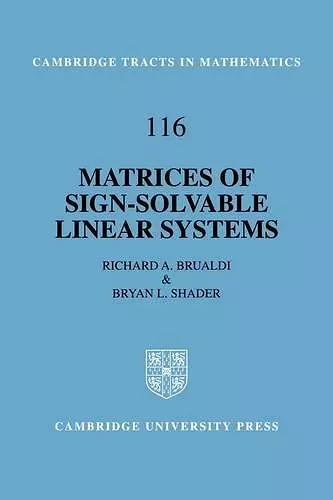Matrices of Sign-Solvable Linear Systems
Bryan L Shader author Richard A Brualdi author
Format:Hardback
Publisher:Cambridge University Press
Published:29th Sep '95
Currently unavailable, and unfortunately no date known when it will be back
This hardback is available in another edition too:
- Paperback£37.99(9780521105828)

The large and diffuse body of literature connected with sign-solvability is presented as a coherent whole for the first time in this book.
The large and diffuse body of literature connected with sign-solvability is presented as a coherent whole for the first time in this book, displaying it as a beautiful interplay between combinatorics and linear algebra.The sign-solvability of a linear system implies that the signs of the entries of the solution are determined solely on the basis of the signs of the coefficients of the system. That it might be worthwhile and possible to investigate such linear systems was recognised by Samuelson in his classic book Foundations of Economic Analysis. Sign-solvability is part of a larger study which seeks to understand the special circumstances under which an algebraic, analytic or geometric property of a matrix can be determined from the combinatorial arrangement of the positive, negative and zero elements of the matrix. The large and diffuse body of literature connected with sign-solvability is presented as a coherent whole for the first time in this book, displaying it as a beautiful interplay between combinatorics and linear algebra. One of the features of this book is that algorithms that are implicit in many of the proofs have been explicitly described and their complexity has been commented on.
"The book is well written and quite readable. It should become an indispensable reference for anyone intersted in questions related to sign solvability of linear systems." Peter M. Gibson, SIAM Review
"...primarily for researchers in combinatorics and linear algebra, it should also be of interest to theoretical computer scientists, economists, physicists, chemists and engineers." Gerard Sierksma, Mathematical Review
ISBN: 9780521482967
Dimensions: 234mm x 159mm x 24mm
Weight: 552g
316 pages